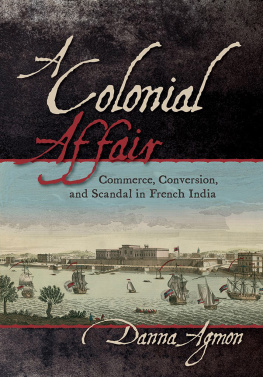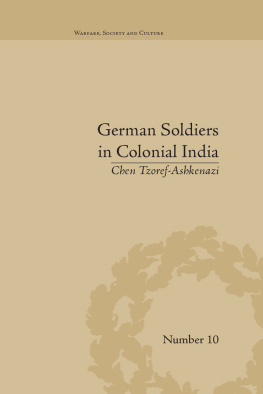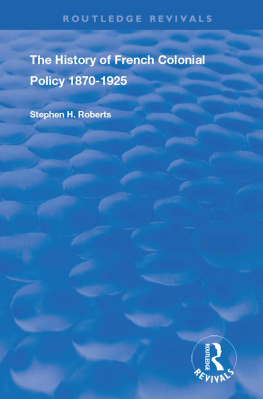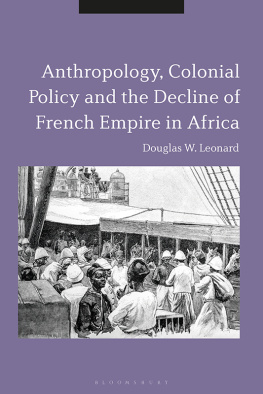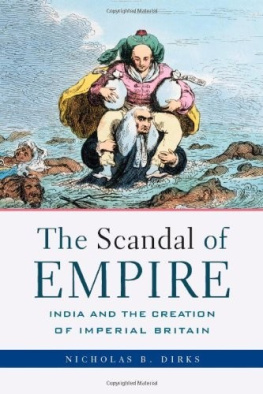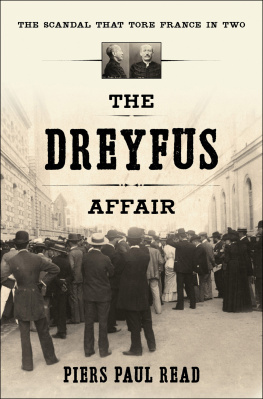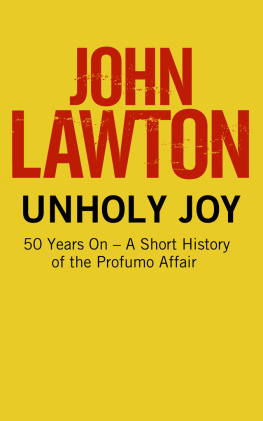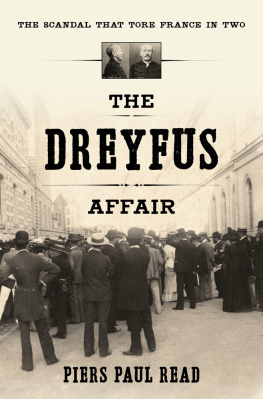Agmon - A colonial affair: commerce, conversion, and scandal in French India
Here you can read online Agmon - A colonial affair: commerce, conversion, and scandal in French India full text of the book (entire story) in english for free. Download pdf and epub, get meaning, cover and reviews about this ebook. City: Índia, year: 2017, publisher: CORNELL UNIVERSITY PRESS, genre: Home and family. Description of the work, (preface) as well as reviews are available. Best literature library LitArk.com created for fans of good reading and offers a wide selection of genres:
Romance novel
Science fiction
Adventure
Detective
Science
History
Home and family
Prose
Art
Politics
Computer
Non-fiction
Religion
Business
Children
Humor
Choose a favorite category and find really read worthwhile books. Enjoy immersion in the world of imagination, feel the emotions of the characters or learn something new for yourself, make an fascinating discovery.
- Book:A colonial affair: commerce, conversion, and scandal in French India
- Author:
- Publisher:CORNELL UNIVERSITY PRESS
- Genre:
- Year:2017
- City:Índia
- Rating:4 / 5
- Favourites:Add to favourites
- Your mark:
- 80
- 1
- 2
- 3
- 4
- 5
A colonial affair: commerce, conversion, and scandal in French India: summary, description and annotation
We offer to read an annotation, description, summary or preface (depends on what the author of the book "A colonial affair: commerce, conversion, and scandal in French India" wrote himself). If you haven't found the necessary information about the book — write in the comments, we will try to find it.
Agmon: author's other books
Who wrote A colonial affair: commerce, conversion, and scandal in French India? Find out the surname, the name of the author of the book and a list of all author's works by series.
A colonial affair: commerce, conversion, and scandal in French India — read online for free the complete book (whole text) full work
Below is the text of the book, divided by pages. System saving the place of the last page read, allows you to conveniently read the book "A colonial affair: commerce, conversion, and scandal in French India" online for free, without having to search again every time where you left off. Put a bookmark, and you can go to the page where you finished reading at any time.
Font size:
Interval:
Bookmark:
So many people have had a role in the writing of this book, and it is a joy to have an opportunity to finally thank them.
I am deeply indebted to the dozens of people, not all of whom can be listed here, who read the manuscript at various stages and so generously shared their insights with me; their good ideas profoundly shaped this work. For these efforts, I thank Richard Allen, Ned Alpers, Daniel Birchok, David William Cohen, Joshua Cole, Alexandre Dub, Nafisa Essop-Sheik, Hlose Finch-Boyer (who deserves a very special note of thanks for first suggesting that I might want to look into French India as a research topic), Malick Ghachem, Federico Helfgott, Daniel Hershenzon, Jennifer Heuer, Steve Hindle, Maya Jasanoff, Paul Christopher Johnson, Lloyd Kramer, Tamara Loos, Jessica Marglin, Aliocha Maldavsky, Jessica Namakkal, Minayo Nasiali, Brian Owensby, Jennifer Palmer, Sue Peabody, Bhavani Raman, Natalie Rothman, Stephen Sparks, Robert Travers, Fredrik Thomasson, David Washbrook, Ellen Welch, Gary Wilder, Matt Wisnowski, Laurie Wood, Akhila Yechury, and Tal Zalmanovich.
I have presented this work in various works-in-progress settings and benefited tremendously from doing so. For this I thank the members of the Anthropology and History Workshop at the University of Michigan, the Historians Writing Group at Virginia Tech, and the Huntington Library Long-Terms Fellows Working Group. I was also aided by the comments made by participants at the North Carolina Research Triangle French History and Culture Seminar and the George Washington University Medieval and Early Modern Studies Institute. Special thanks go to the group of anthropologists who let me into their stimulating and productive work-in-progress group: Laura Brown, Elana Buch, Monica Patterson, and Bridget Guarasci. I am also grateful to the two anonymous readers who so deeply engaged with the manuscript, the sharp insights provided by my editor Mahinder Kingra, and the terrific staff at Cornell University Press.
In various archives, in Aix-en-Provence, Puducherry, Paris, and Nantes, I have received the help of thoughtful professionals. Special thanks are due to the staff at the wonderful Archives nationales doutre-mer in Aix-en-Provence and to Mme. Brigitte Appavou of the archives of the Missions trangres de Paris, Mme. Ccile de Cacqueray of the Bibliothque Francisicane des Capucins in Paris, and Pre Robert Bonfils of the Jesuit archives in Vanves. I am grateful to the American Institute of Indian Studies and especially to Purnima Mehta in Delhi for her assistance, which made possible my time at the archives of the Record Centre, Puducherry. There Mr. M. Murugesan, the assistant archivist, was exceptionally helpful.
I consider it the greatest piece of good luck to have been trained in the joint program in anthropology and history at the University of Michigan. The intellectual curiosity, passion, and generosity that characterized everyone involved with the program, far too many people to name here, taught me so much and continue to inform my work. I have been extremely fortunate to have a group of dedicated and brilliant mentors, who support me professionally and intellectually. Most important, Dena Goodman, Diane Owen Hughes, and Sumathi Ramaswami have been the most insightful readers and the fiercest advocates, and my gratitude for their wisdom and constant efforts on my behalf is immense. In Ann Arbor and Paris, I was able to enlist, respectively, Webb Keane and Ines upanov as my marvelous mentors, and since I arrived at Virginia Tech, I have been helped by the ongoing collegial support offered by Mark Barrow, Franois Debrix, and Helen Schneider.
Institutional support for this project made possible travel to archives in France and India and funded precious time to write. I am grateful for financial support provided at the University of Michigan by the Rackham Graduate School, a Barbour Scholarship, and the Center for Medieval and Early Modern Studies. A Bourse Chateaubriand from the French government, a fellowship from the Center for European Studies, a Franklin Research Grant from the American Philosophical Society, and several grants from Virginia Techs College of Liberal Arts and Human Sciences also funded archival and writing time. Most crucially, at key junctions of the development of this work, yearlong fellowships provided not only time to write but also an inspiring community of fellow writersfirst, at the Institute for the Humanities at the University of Michigan, and more recently at the Huntington Library in San Marino, California, where a Barbara Thom long-term fellowship enabled me to complete the manuscript. Both institutions provided a setting that advanced this work in myriad ways and helped to convince me that even individual scholarship is best pursued in fellowship. Ive acted on this belief by writing most of this book in a variety of daily writing groups and partnerships. Two of my writing partners deserve special thanks. Bridget Guarsci in Ann Arbor and later Dale Winling in Blacksburg heard me talk about Nayiniyappa more than was perhaps fair, and their insights and generous engagement were extremely helpful. For their camaraderie, steadfastness, and shared commitment to the pomodoro writing system, I also thank Carmen Gitre, Melanie Kiechle, Elizabeth Mazzolini, Xotichl Ruiz, and the Huntington Fellows daily writing group, especially Tawny Paul, Daniel Immerwhar, Martha Rust, and Alice Fahs.
For their love, patience, and unwavering boosterism from across the sea, my thanks go to my parents, Ora and Tamir Agmon, and my sister, Tal Elazar. My deepest words of gratitude go to Dan Simundza, whose wisdom, good humor, and unfailing, abiding support have strengthened and sustained me.
Portions of chapter 2 were first published in Danna Agmon, The Currency of Kinship: Trading Families and Trading on Family in Colonial French India, Eighteenth-Century Studies 47, no. 2 (2014): 13755. Copyright 2014 Johns Hopkins University Press. Portions of chapter 5 were first published in Danna Agmon, Intermediaries on the Move: Mobility and Stability in the Making of Colonial Go-Betweens in Eighteenth-Century India, in Intermdiares Culturels/Cultural Intermediaries: Sminaire International des Jeunes Dix-Huitimistes, ed. Vanessa Alayrac-Fielding and Ellen R. Welch (Paris: Honor-Champion, 2015), 21736. Copyright 2015 Editions Honor-Champion.
CHAPTER 1
a Colonial Scandal
When he was twenty years old, Nayiniyappa, a merchant of Madras, moved to the newly established French colony of Pondichry. Forty-three years later, in 1717, he died in a prison cell in Fort St. Louis, Pondichrys center of French administrative and military power in India. At the time of his death he had served three months of a three-year prison sentence for the crimes of tyranny and sedition, having been removed from his post as the colonys chief commercial broker and head of the towns indigenous population, a position the French referred to as courtier and chef des malabars. As Pondichrys chief commercial intermediary, Nayiniyappa had amassed considerable property, but the French confiscated all his wealth, including precious gems, horses, elephants, and several houses. In a rite of public humiliation, he was whipped with fifty lashes in Pondichrys main bazaar. Had he lived out his prison term, he and his entire family would have been banished from the colony forever. None of these details are contested. The meanings of the scandal that came to be known in India and in France as laffaire Nayiniyappa are not nearly as straightforward.
The Nayiniyappa Affair has a haunting quality. Fort St. Louis no longer stands, so Nayiniyappas ghost hovers instead in the archives. Officials of the Compagnie des Indes in Pondichry maintained detailed yearly logs of their doings, as well as copies of all their correspondence.
Font size:
Interval:
Bookmark:
Similar books «A colonial affair: commerce, conversion, and scandal in French India»
Look at similar books to A colonial affair: commerce, conversion, and scandal in French India. We have selected literature similar in name and meaning in the hope of providing readers with more options to find new, interesting, not yet read works.
Discussion, reviews of the book A colonial affair: commerce, conversion, and scandal in French India and just readers' own opinions. Leave your comments, write what you think about the work, its meaning or the main characters. Specify what exactly you liked and what you didn't like, and why you think so.

